
- Homepage
- Blade Edge
- Blade Material
- 1095 Carbon Steel (7)
- 20cv (6)
- Bohler M390 (5)
- Carbon Steel (732)
- Cpm-20cv (11)
- Cpm-s35vn (9)
- D2 Steel (6)
- Damascus (17)
- Damascus Steel (190)
- Elmax (9)
- Elmax Steel (5)
- Folded Carbon Steel (6)
- Folded Steel (34)
- High Carbon Steel (14)
- M390 (26)
- S35vn (19)
- S90v (7)
- Stainless Steel (462)
- Steel (8)
- Zdp-189 (5)
- Other (789)
- Blade Range
- Blade Type
- 0452cf (4)
- Cleaver (5)
- Clip Point (238)
- Dagger (7)
- Drop Point (334)
- Drop Point, Tanto (4)
- Harpoon (7)
- Hawkbill (17)
- Karambit (20)
- Leaf (13)
- Pen (6)
- Reverse Tanto (6)
- Sheepsfoot (29)
- Spear Point (78)
- Straight Back (8)
- Tanto (66)
- Trailing Point (10)
- Upswept (7)
- Upswept Skinner (3)
- Wharncliffe (74)
- Other (1431)
- Dexterity
- Type
Clay Tempered Folded 15 Times Bare Blade T10 Carbon Steel For Samurai Katana
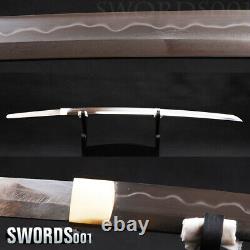
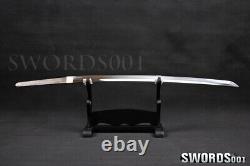
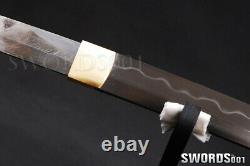
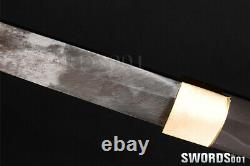
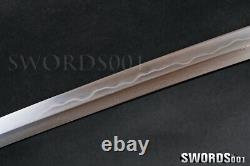
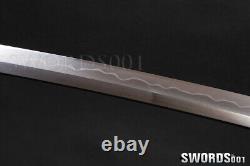
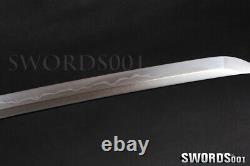
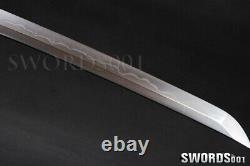
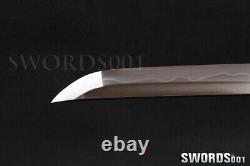
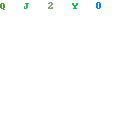
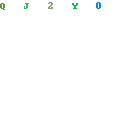
Clay Tempered Folded 15 Times Bare Blade T10 Carbon Steel For Samurai Katana. Hamon: Real clay tempered hamon. 13 times hand forged and polished.
Please allow 1-2cm differs due to manual measurement, thanks. Now we add a free brass habaki for each blade.
The data cannot be exactly same as we offer. There is no hole on the nakago/tang of the blade. You should drill that yourself, if you want us to drill for u, the place will be chosen randomly, hope you can understand. Usually we don't maintain the nakago part.
BLADE: The blade has been hand forged using the ancient method of sword making. Full hand forged, hand polished and hand sharpened. This blade has been hand polished with multiple grade sharpen stone by Japanese method, which made the surface of the blade like a mirror, the blade is also very sharp. This blade comes with a full length Tang which greatly enhances the strength of the sword.This blade is strong enough to cut through a thick bamboo tree. HOW TO APPRECIATE BLADE QUALITY. Generally, we appreciate blades with the three elements.
At first shape, then steel, and then hamon. You must take an over-all look at the blade first.
Seeing the shape completely is very important to appreciate blades. It should be well-ordered from the bottom of tang to the top of kissaki. All the elements of the blade are condensed to its shape. So understanding the distinction between good shape and poor shape is necessary to know its quality. For the good shape, every line must be smooth and sharp, every surface even, and full meat is kept on the cutting surface.
And the harmony of the whole shape is most important. A good shape will come from good steel and good tempering. It illustrates a sense of the smith. But it is difficult to explain the "shape" by words or images."Good shape" doesn't mean some design of blade. It is general word used for every kind of style of blades. Steel is a base of blade quality.
A good steel is necessary for good shape and for good tempering effect. It is not a meaning of layer pattern.
Various types of Hamon patterns are attractive for beginners eye, but to see the quality of hamon is far more important. Utsuri (shadow of hamon) also can be seen by this way. Hamon pattern is not a matter for blade quality.Difference of hamon pattern means just a difference of pattern, never mean difference of quality. Hamon is the most visible appearance of the sword.
Looking at it is very interesting. Hamon is a big factor of the character of a blade. Its pattern is very attractive for beginners eye. But, the pattern does not mean the quality. An aesthetic hamon pattern doesn't mean a good hamon. It is just a matter of liking. The brightness and the fineness of the hamon, not only the hamon line but also the hamon area, is a bigger criterion of the quality. HOW TO TREAT THE BLADE? Japanese blade is made from the pure steel, and is completely polished. So, suitable treatment is necessary.Because the surface is delicate and the cutting edge is very sharp. The blade should be always coated with good oil. And we never touch the blade with naked finger. Please do not put the blade on a carpet.
Please put it on a clean table cloth and use some soft cloth or paper as a pillow for the blade. Careless treatment makes scratches onto the blade surface. Please contact with us before you leave feedback. We will try our best to solve the problem for you, thank you.
Sometimes, you may not get our reply immediately due to the time difference among each country. However, please be assured that we'll strive to reply you as soon as possible once we got your messages. International Buyers - Please Note. This item is in the category "Collectibles\Knives, Swords & Blades\Blade Parts, Supplies & Accs\Blade Parts & Supplies".The seller is "swords001" and is located in this country: CN. This item can be shipped worldwide.
- Country/Region of Manufacture: China
- Type: Blade
- Edge: Single, Curved
- Handle Material: Wood
- Tang: Full
- Handedness: Single-Handed
- Blade Material: Damascus Steel
- Dexterity: Right-Handed
- Theme: Samurai
- Original/Reproduction: Original
- Brand: SJ SHI JIAN
- Color: Silver

